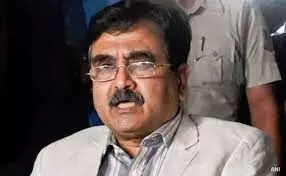
Politicians in the judiciary
text_fieldsThere are certain boundaries which are not defined in the legal code but which the nation adheres to as a commonly agreed ethical value. Violation of them by those in responsible positions would give cause for concern. It was such a breach of precedent that a (former) judge Abhijit Gangopadhyay committed the other day. Gangopadhyay was a judge in the Calcutta High Court when he submitted his resignation last Tuesday, and then closely thereafter, he announced his decision to join the BJP. Explaining the decision, he said: "I approached the BJP; BJP has also approached me". During his tenure as a judge, he was constantly criticizing the Trinamool Congress government in West Bengal and ordered several investigations against the actions of that government as well as Trinamool Congress workers. At that time, there were many who viewed this as a bold act of judicial activism intended to prevent the abuses of the government. But his subsequent entry into politics leads us to believe that he was driven more by political inclinations than by a sense of justice. It is Gangopadhyay himself who revealed that he approached the BJP members while he was a sitting judge and the BJP members approached him too. By resigning and joining the BJP straight away, he has put his previous judicial decisions under a cloud of suspicion.
The Judiciary, which constitutes the core of the justice delivery system, is envisioned to maintain a respectable distance from the administrative arm, the government (Executive), and the parties that control it. This has been well followed in the past. The executive was also careful not to be too close to the judiciary. It is not enough that justice and law are implemented, they should also be seen by people as being implemented. But of late, the closeness between the two seems to be going beyond propriety. India's Supreme Court complex was inaugurated by Nehru, the first Prime Minister. But for six decades thence, no prime minister entered the court as a visitor and no judge visited the ministerial buildings, because of the conviction that there was a need for distance between the two arms. That precedent was, however, breached in 2018 when Prime Minister Modi made a surprise visit to the court of the Chief Justice.
At that time, legal sources expressed the opinion that such a visit should not have been made when the cases against the government such as the Rafale deal case and the overnight replacement of the CBI head by the government were being considered by the same court. However, since then the country has not been seeing any reduction in the loss of propriety, instead it has been on the increase. There have been judgments that raise concerns about whether the judiciary is yielding to the government. Even in legal circles, the suspicions started growing that judges were compromising their sacred calling for post-retirement bounties proffered by the government to such an extent that posts like that of governor were given to the judges. One of the judges who gave the verdict in the Ayodhya case landed in the Rajya Sabha and another in the Raj Bhavan thanks to the generosity of the government.
Things are now moving beyond that extent, as illustrated by Gangopadhyay's entry into politics. There are more and more of those who have to handle cases against the government, but have no hesitation to praise the ministers and the prime minister while they are sitting judges. Those from Arun Mishra and MR Shah to Gangopadhyay, have created controversy for praising Modi. And the judge in UP Ravikumar Diwakar, who passed the controversial order in the Gyanwapi msoque case, made headlines by lauding the UP chief minister. This may not be barred by law. But that results in loss of credibility and independence of one's own position. And there is no law either barring the entry into politics of one who has ceased to be a judge. Jurists are of the opinion that although this is not prohibited, there should be a cooling period between the two. But even then, that cannot stop him from serving a party while in service. Abhijit Gangopadhyay hounded BJP's adversaries and used judicial powers against them. And he issued controversial orders one after the other enabling fourteen CBI probes and four arrests. That went to the extent of incurring Supreme Court's displeasure by giving an interview to a TV channel about a case during its pendency. Will the fairness and justice of judgements issued by such a person be convincing to the citizenry? It is the credibility and independence that are endangered by such tendencies. This calls for a serious discussion and guidance from the Supreme Court.

























